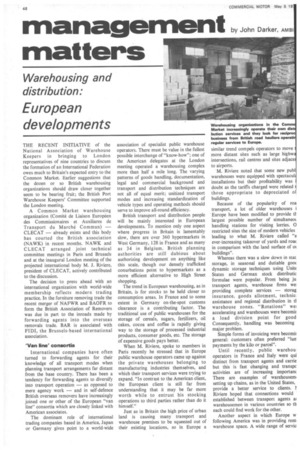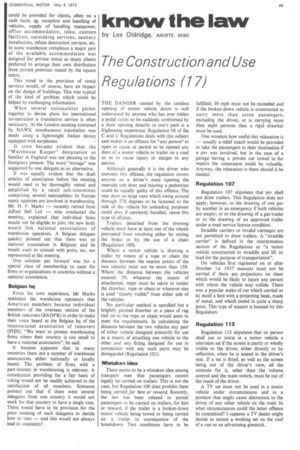management by John Darker AM B I
Page 50

Page 51

If you've noticed an error in this article please click here to report it so we can fix it.
matters
Warehousing and distribution:
European developments
THE RECENT INITIATIVE of the National Association of Warehouse Keepers in bringing to London representatives of nine countries to discuss the formation of an International Federation owes much to Britain's expected entry to the Common Market. Earlier suggestions that the dozen or so British warehousing organizations should draw closer together seem to be bearing fruit; the British Port Warehouse Keepers' Committee supported the London meeting.
A Common Market warehousing organization (Comite de Liaison Europeen des Commissionaires et Auxiliares de Transport du Marche Commun) -CLECAT — already exists and this body has courted the British association (NAWK) in recent months. NAWK and CLECAT arranged joint technical committee meetings in Paris and Brussels and at the inaugural London meeting of the projected international body M. J. Riviere, president of CLECAT, actively contributed to the discussion.
The decision to press ahead with an international organization with world-wide membership reflects modern trading practice. In the furniture removing trade the recent merger of NAFWR and BAOFR to form the British Association of Removers was due in part to the inroads made by forwarding agents into the overseas removals trade. BAR is associated with FIDI, the Brussels-based international association.
'Van line consortia
International companies have often turned to forwarding agents for their knowledge of all transport modes when planning transport arrangements far distant from the base country. There has been a tendency for forwarding agents to diversify into transport operation — as opposed to mere agency work — and in self-defence British overseas removers have increasingly joined one or other of the European "van line" consortia which are closely linked with American associates.
The dominant role of international trading companies based in America, Japan or Germany gives point to a world-wide association of specialist public warehouse operators. There must be value in the fullest possible interchange of "know-how"; one of the American delegates at the London meeting operated a warehousing complex more than half a mile long. The varying patterns of goods handling, documentation, legal and commercial background and transport and distribution techniques are not all of equal merit; unitized transport modes and increasing standardization of vehicle types and operating methods should serve to improve all-round efficiency.
British transport and distribution people will be mainly interested in European developments. To mention only one aspect where progress in Britain is lamentably slow, there are over 360 hypermarkets in West Germany, 128 in France and as many as 34 in Belgium. British planning authorities are still dubious about authorizing development on anything like this scale, though our densely trafficked conurbations point to hypermarkets as a more efficient alternative to High Street shopping.
The trend in European warehousing, as in Britain, is for stocks to be held closer to consumption areas. In France and to some extent in Germany on-the-spot customs clearance is a contributing factor. The traditional use of public warehouses for the storage of cereals, sugars, fertilizers, oil cakes, cocoa and coffee is rapidly giving way to the storage of processed industrial products, consumer goods, etc. The storage of expensive goods pays better.
When M. Riviere, spoke to members in Paris recently he stressed that in Europe public warehouse operators came up against the private warehouses belonging to manufacturing industries themselves, and which their transport services were trying to expand. "In contrast to the American client, the European client is still far from understanding that it may be far more worth while to entrust his stocking operations to third parties rather than do it himself."
Just as in Britain the high price of urban land is causing many transport and warehouse premises to be squeezed out of their existing locations, so in Europe a similar trend compels operators to move more distant sites such as large highw intersections, rail centres and sites adjace to airports.
M. Riviere noted that some new publ warehouses were equipped with spectacul installations but their profitability was doubt as the tariffs charged were related those appropriate to depreciated ol buildings.
Because of the popularity of roa transport, a lot of older warehouses i Europe have been modified to provide th largest possible number of simultaneot handling stations for visiting lorries. 0 restricted sites the size of modern vehicles leading to what M. Riviere called "a ever-increasing takeover of yards and roat in comparison with the land surface of cot buildings".
Whereas there was a slow down in stat storage, in seasonal and dutiable goat dynamic storage techniques using Unite States and German stock distributic formulae were popular. From being ju transport agents, warehouse firms we providing complete services — storag insurance, goods allotment, technic. assistance and regional distribution in ti warehouse zones. "Rotations" wei accelerating and warehouses were becomit a load division point for good Consequently, handling was becoming major problem.
Simple forms of invoicing were becomit general: customers often preferred "hut payments by the kilo or parcel".
Until recently, public warehou: operators in France and Italy were qui distinct from transport agents and carrie but this is fast changing and transpc activities are of increasing importanc There are examples of warehousent setting up chains, as in the United States, provide a better service to clients. Riviere hoped that connections would established between transport agents al warehousemen in various countries so th each could find work for the other.
Another aspect in which Europe w following America was in providing rent warehouse space. A wide range of servic could be provided for clients, often on a cash basis, eg. reception and handling of vehicles, supply of handling manpower, office accommodation, telex, canteen facilities, caretaking services, sanitary installations, refuse destruction services, etc. In some warehouse complexes a major part of the available accommodation was assigned for private rental as many clients preferred to arrange their own distribution from private premises rented by the square metre.
This trend to the provision of rental services would, of course, have an impact on the design of buildings. This was typical of the kind of problem which could be helped by exchanging information. • When several nationalities gather together to devise plans for international co-operation a translation service is often necessary. At the London meeting convened by NAWK simultaneous translation was made using a lightweight Italian device equipped with earphones.
It soon became evident that the "Warehouse Keeper" designation so familiar in England was not pleasing to the foreigners present. The word "storage" was suggested by one delegate as an alternative.
It was equally evident that the draft articles of association before the meeting would need to be thoroughly vetted and amplified by a small sub-committee comprising several nationalities. In Europe many agencies are involved in warehousing. Mr. H. F. Marks — recently retired from Alfred Bell Ltd — who conducted the meeting, explained that individual firms would not be eligible to join; the new body would link national associations of warehouse operators. A Belgian delegate quickly pointed out that there was no national association in Belgium and he would want to consult with ports, etc, not represented at the meeting.
One solution put forward was for a special class of membership to cater for firms or organizations in countries without a national association.
Belgian hq From his own experience, Mr Marks reminded the warehouse operators that American members became individual members of the overseas section of the British removers (BAOFR) in order to make their voice heard at the Belgian hq of the international association of removers (FIDI). "We want to protect warehousing firms where their country is too small to have a national association", he said.
It became apparent that in many countries there are a number of warehouse associations either nationally or locally based. The problem of firms with a part-interest in warehousing is relevant. A constitution providing for a fair basis of voting would not be readily achieved to the satisfaction of all members. Someone pointed out that if there were several delegates from one country it would not work for that country to have a single vote. There would have to be provision for the prior meeting of such delegates to decide how to vote — and this would not always lead to unanimity!




























































































